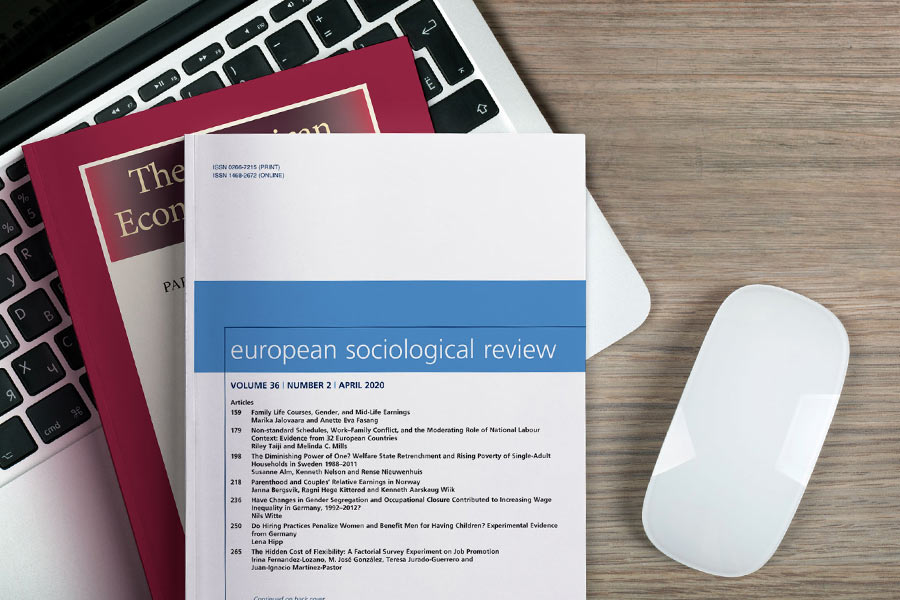Total hits 17.461
-
Erwerbstätigkeit Älterer im internationalen Vergleich: Deutschland hat kräftig aufgeholt (Interview mit Ulrich Walwei)
Keitel, C. & Schludi, M.; Walwei, U. (sonst. bet. Pers.) (2024): Erwerbstätigkeit Älterer im internationalen Vergleich: Deutschland hat kräftig aufgeholt (Interview mit Ulrich Walwei). In: IAB-Forum No. 10.07.2024. DOI:10.48720/IAB.FOO.20240710.01
-
How political connections shape firm outcomes in Germany
Diegmann, A., Pohlan, L. & Weber, A. (2024): How political connections shape firm outcomes in Germany. Opinion. In: IZA world of labor, o. Sz.
-
Ältere Arbeitskräfte im demografischen Wandel: Beschäftigungspotenziale im internationalen Vergleich
Walwei, U. (2024): Ältere Arbeitskräfte im demografischen Wandel: Beschäftigungspotenziale im internationalen Vergleich. (IAB-Forschungsbericht 14/2024 (de)), Nürnberg, 26 p. DOI:10.48720/IAB.FB.2414
-
Wachstumspaket: Was wirkt?
Weber, E. (2024): Wachstumspaket: Was wirkt? In: LinkedIn No. 2024-07-10 1 p.
-
EU-Reaktion auf chinesische Subventionen: Sonderzölle bergen wesentliche Risiken (Interview mit Ignat Stepanok und Holger Görg)
Keitel, C. & Schludi, M.; Görg, H. & Stepanok, I. (interviewed person) (2024): EU-Reaktion auf chinesische Subventionen: Sonderzölle bergen wesentliche Risiken (Interview mit Ignat Stepanok und Holger Görg). In: IAB-Forum No. 08.07.2024. DOI:10.48720/IAB.FOO.20240708.01
-
Gig-work in the German delivery-services sector: Employment has increased significantly in recent years
Friedrich, M., Jost, R., Lang, J. & Müller, C. (2024): Gig-work in the German delivery-services sector: Employment has increased significantly in recent years. In: IAB-Forum No. 08.07.2024. DOI:10.48720/IAB.FOO.20240709.01
-
Part-time subsidies and maternal reemployment: Evidence from a difference-in-differences analysis
Zimmert, F. & Zimmert, M. (2024): Part-time subsidies and maternal reemployment: Evidence from a difference-in-differences analysis. In: Journal of Applied Econometrics, Vol. 39, No. 6, p. 1149-1171. DOI:10.1002/jae.3072
-
Immigration monitor June
Brücker, H., Hauptmann, A. & Keita, S. (2024): Zuwanderungsmonitor Juni. (Institut für Arbeitsmarkt- und Berufsforschung. Aktuelle Daten und Indikatoren), Nürnberg, 8 p. DOI:10.48720/IAB.ZM.2406
-
Gender Pay Gap variiert stark zwischen den Branchen
Collischon, M. & Zimmermann, F. (2024): Gender Pay Gap variiert stark zwischen den Branchen. In: IAB-Forum – Grafik aktuell No. 03.07.2024.
-
Intellectual property rights protection and the dynamic gains from trade
Migueles Chazarreta, D. & Stepanok, I. (2025): Intellectual property rights protection and the dynamic gains from trade. In: Economic Theory, Vol. 79, No. 2, p. 445-495. DOI:10.1007/s00199-024-01584-7
-
Skill Supply, Technology Diffusion and the Labor Market
Stepanok, I. & Tesfaselassie, M. (2024): Skill Supply, Technology Diffusion and the Labor Market. In: German Economic Review, Vol. 25, No. 2, p. 101-125. DOI:10.1515/ger-2023-0098
-
Who Perceives Lower Wages for Women to be Fair? How Perceptions of the Fairness of Men’s and Women’s Wages Vary by Firm and Workplace Characteristics
Strauss, S., Brüggemann, O. & Lang, J. (2024): Who Perceives Lower Wages for Women to be Fair? How Perceptions of the Fairness of Men’s and Women’s Wages Vary by Firm and Workplace Characteristics. (Working Paper Series / Universität Konstanz, Cluster of Excellence 'The Politics of Inequality' 29), Konstanz, 33 p. DOI:10.48787/kops/352-2-sofyhpevr9ys3
-
Wir sehen Nationalität und Internationalität nicht als Gegensätze, sondern als Zusammenspiel (Interview mit Yuliya Kosyakova und Bernd Fitzenberger)
Keitel, C. & Wallheinke, A.; Fitzenberger, B. & Kosyakova, Y. (sonst. bet. Pers.) (2024): Wir sehen Nationalität und Internationalität nicht als Gegensätze, sondern als Zusammenspiel (Interview mit Yuliya Kosyakova und Bernd Fitzenberger). In: IAB-Forum No. 01.07.2024. DOI:10.48720/IAB.FOO.20240701.01
-
Is My Wage Fair? : Validating Fairness Perceptions Among Women and Men
Diehl, C., Lang, J., Strauss, S. & Brüggemann, O. (2024): Is My Wage Fair? : Validating Fairness Perceptions Among Women and Men. (Working Paper Series / Universität Konstanz, Cluster of Excellence 'The Politics of Inequality' 33), Konstanz, 33 p. DOI:10.48787/kops/352-2-ic19t4vrxlek9
-
Working on national topics and being part of the international research community go very well together (Interview)
Keitel, C.; Kosyakova, Y. & Fitzenberger, B. (sonst. bet. Pers.) (2024): Working on national topics and being part of the international research community go very well together (Interview). In: IAB-Forum No. 01.07.2024. DOI:10.48720/IAB.FOO.20240701.02
-
Worker Representatives
Budde, J., Dohmen, T., Jäger, S. & Trenkle, S. (2024): Worker Representatives. (NBER working paper / National Bureau of Economic Research 32740), Cambridge, Mass, 78 p.
-
Einschätzung des IAB zur wirtschaftlichen Lage - Juni 2024
Bauer, A. & Weber, E. (2024): Einschätzung des IAB zur wirtschaftlichen Lage - Juni 2024. In: IAB-Forum No. 28.06.2024. DOI:10.48720/IAB.FOO.20240628.01
-
The Mannheim Enterprise Panel linked to the Establishment History Panel of the IAB 2010–2020 (MUP-BHP 1020)
Diegmann, A., Gottschalk, S., Hälbig, M., Schmucker, A. & Wolter, S. (2024): The Mannheim Enterprise Panel linked to the Establishment History Panel of the IAB 2010–2020 (MUP-BHP 1020). (FDZ-Datenreport 03/2024 (en)), Nürnberg, 104 p. DOI:10.5164/IAB.FDZD.2403.en.v1
-
Organized Labor Versus Robots? Evidence from Micro Data
Findeisen, S., Dauth, W. & Schlenker, O. (2024): Organized Labor Versus Robots? Evidence from Micro Data. (CEPR discussion paper / Centre for Economic Policy Research 19192), London, 31 p.
-
Mannheimer Unternehmenspanel verknüpft mit dem Betriebs-Historik-Panel 2010–2020 (MUP-BHP 1020)
Diegmann, A., Gottschalk, S., Hälbig, M., Schmucker, A. & Wolter, S. (2024): Mannheimer Unternehmenspanel verknüpft mit dem Betriebs-Historik-Panel 2010–2020 (MUP-BHP 1020). (FDZ-Datenreport 03/2024 (de)), Nürnberg, 106 p. DOI:10.5164/IAB.FDZD.2403.de.v1



